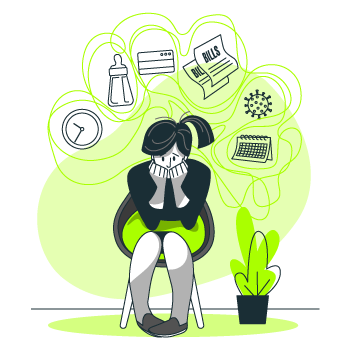Stress vs Anxiety
- Home
- Blog
- Stress vs Anxiety
Stress and anxiety are commonly confused with one another, but they are two different conditions with opposing influences on physical and mental well-being. Stress usually comes on rapidly in response to specific external pressures, while anxiety is chronic and ongoing apprehension or fear for which there is often no identifiable cause. Each disorder brings with it daily life disruptions, including insomnia and fatigue, even chronic pain.
Stress is the body's natural response to outside pressures or demands, such as work deadlines, financial concerns, or personal conflicts. It’s usually short-term, but it can even be a motivating factor in confronting challenges. However, long-lasting or overwhelming stress can harm both physical and mental well-being.
Anxiety, however, describes an internal state characterized by persistent fear, worry, or apprehension, often without an apparent cause. Unlike stress, anxiety doesn’t dissipate immediately once the threat is removed. Instead, it thrives on undue non-relevant thoughts and worries and can interfere with daily living; therefore, it is a more chronic condition.

Acupuncture for Stress Relief alleviates stress and anxiety through the natural mechanisms of harmonizing the energies and inducing relaxation. Here is how it can help:
Stress can easily slip into anxiety, and chronic stress eventually. Chronic stress can evolve into various levels of anxiety, which are definitely more complicated mental health conditions. If stressors are of long duration, the body is always ready and on high alert, exacting stress on both physical and emotional levels. When this goes on for some time, the brain chemicals may be altered, which heightens the chances of the development of anxiety disorders such as generalized anxiety disorder or panic attacks.
Some key indicators that stress is evolving into anxiety include:

Stress and anxiety can invade normal daily routines, make family and social relationships more difficult, and hinder performance at work or school. The moment it begins interfering with your regular functioning, it is now time to consult a professional. Therapists, counsellors, or holistic practitioners such as those at a Holistic Healing Center can provide tailored treatments.
For those looking for the Best Acupuncture Clinic, acupuncture is one of the natural, drug-free treatments known to effectively relieve stress and anxiety, providing relief without medication. Seeking professional assistance assures that you have someone who can support you through your healing process.